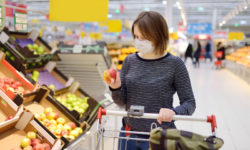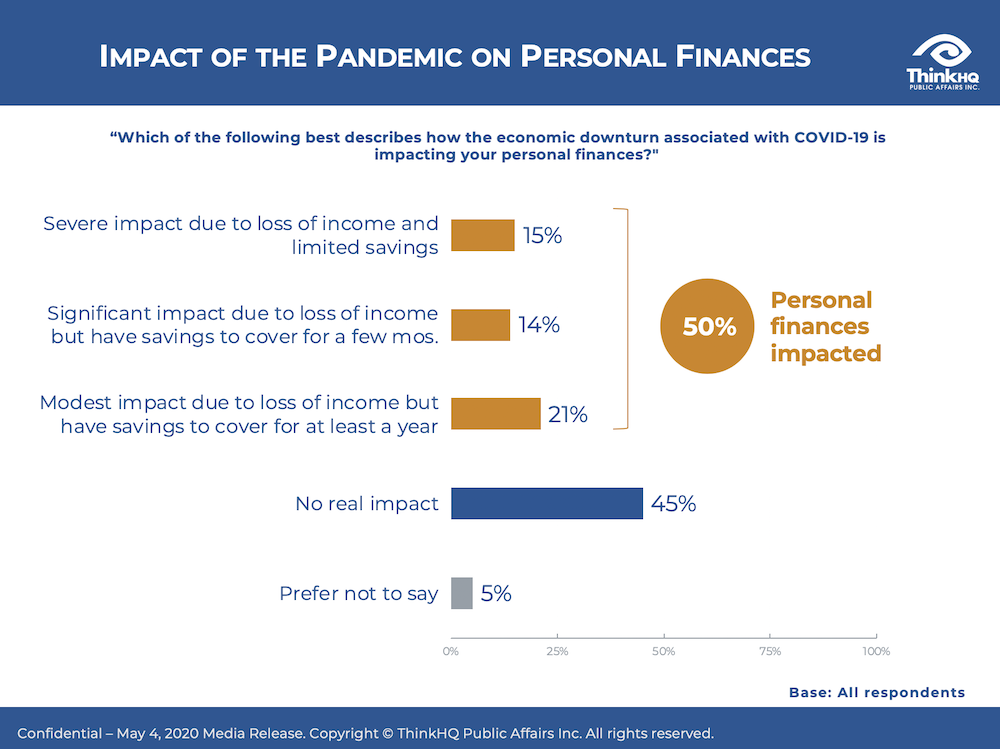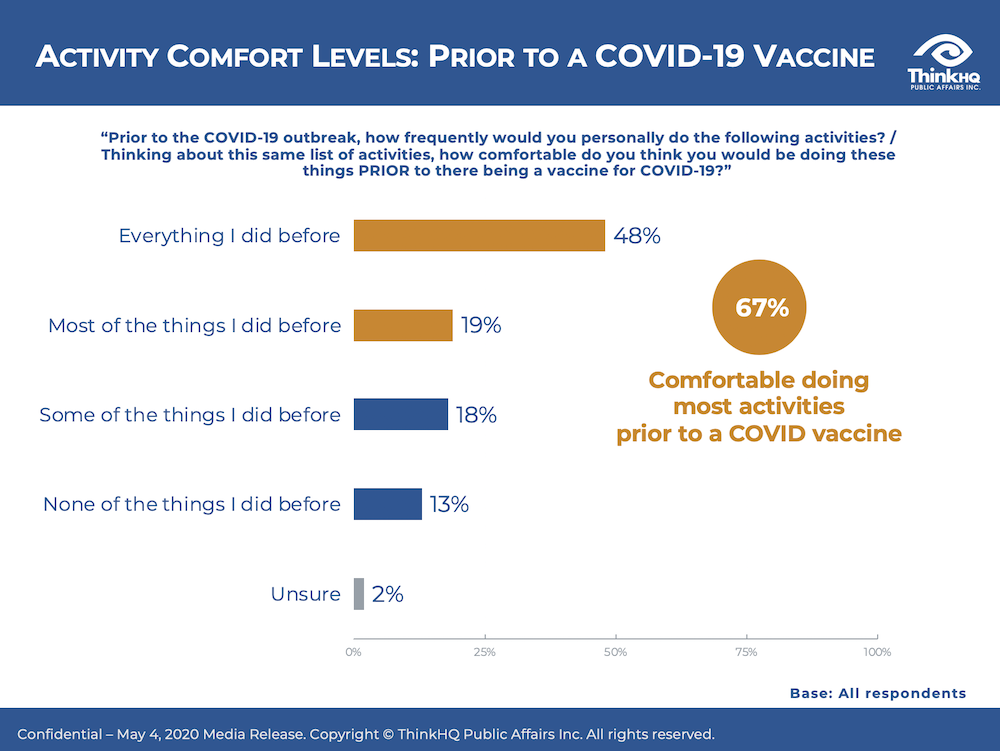
(May 4, 2020 – FOR IMMEDIATE RELEASE)
.
(CALGARY) There is no doubt that COVID-19 is taking a toll on Albertans in a variety of ways, according to a new ThinkHQ survey. Financially, one-third report a disruption to their employment status since March 1st, and almost 30% believe they will have trouble making ends meet beyond the next couple of months. For most Albertans however, by far the most difficult challenge posed by COVID is the loss of contact with friends, family and loved ones outside of their households, and growing anxiety about the state of Alberta’s economy.
.
With the Province announcing a “phased re-opening” of the economy underway, many Albertans are looking forward to and are reasonably comfortable with some easing of “isolating”, particularly involving their closest relationships. That said, removal of prohibitions on commercial contacts may be easing, but it won’t necessarily translate into a return to normal for many businesses. Generally speaking, until there is a vaccine for COVID-19 many Albertans will still be very wary of certain activities, with comfort influenced by the size, familiarity and opportunity for social distancing of the activity itself. Albertans may be comfortable visiting their doctor’s office again, socializing at home with friends, and even getting a haircut, but a majority will still be avoiding air travel (particularly international travel) and major events such as sports, concerts and conventions.
.
Restaurants and retail have been particularly hard hit by the economic shutdown, and while these businesses will begin to re-open, over one-third of their former customers may be unlikely to return until there is a vaccine.
.
Speaking of which, eight-in-ten (80%) of Albertans report that if and when a COVID-19 vaccine is developed, they are at least somewhat likely to be inoculated. While this figure seems overwhelming initially, based on previous research with flu vaccine rates (comparing initial intentions vs. actual behaviour), the adjusted/likely level of vaccination would be more in the neighbourhood of 36% – 40% of Albertans which could pose a challenge for public health authorities managing public health.
.
Financial Impact of COVID
.
COVID-19 has taken a serious toll on Alberta’s labour market, with one-third (34%) of those interviewed who were employed on March 1st reporting that they have had a change in their employment status since. One-tenth (11%) of Alberta’s pre-COVID labour force has been laid off or lost their jobs, while 14% have seen a reduction in hours, and another 9% say some other disruption in their employment status (e.g. cut in pay, reduced income of self-employed/business owners, etc.). Two-thirds (66%) of Albertans tell us their employment status has not changed since March 1st.
.
Though direct changes to employment have touched a large minority of Albertans, a majority have been financially impacted by the pandemic and its economic consequences. Fully 15% of those interviewed say the financial strain of COVID response has been severe for them (due to loss of income and limited savings), while another 14% characterize it as a “significant” hit to their pocketbooks (due to a loss of income and savings that could carry them for only a couple of months). Meanwhile one-fifth (21%) say they have felt a financial bite from the COVID response, but feel they have enough financial wherewithal to sustain themselves for at least a year. Only 45% of Albertans have not experienced any real financial impact from COVID.
.

.
- Not surprisingly, those who have experienced job loss/employment changes report the highest and most severe financial strain from COVID, along with those who are self-employed/business owners
- Just over one-in-five (22%) Albertans with children living in their household report a severe financial strain due to the economic consequences of the virus
.
What are the Worst Things About Living in a “Lockdown”?
.
Our April survey sought to categorize and rank the most difficult challenges Albertans are facing in the daily lives while coping with COVID response. To do this, we tested 29 different impacts using a trade-off exercise (Max Diff). This methodology tends to be more accurate than traditional rating or ranking questions as it requires respondents to make sometimes difficult choices (i.e. most negative/least negative impacts) in their evaluations, and through statistical analysis provides not only a ranking of each, but also its relative difference from other items tested.
.
By far, the most difficult thing for most Albertans to cope with during this public health crisis is lack of physical contact with their friends/family/loved ones created by “isolating. This issue ranks well ahead of the others tested and is consistently ranked as the “#1 Worst thing” across demographic breaks.
.
Second, well back of missing friends and family but well ahead of other issues is growing anxiety about the state of Alberta’s economy. Again, this concern is consistently ranked second across all strata of society.
.
Next on the ranking we find a cluster of issues that can be considered serious concerns for Albertans. These include the lack of access to products and services (e.g. shortages or due to prohibitions like haircuts, dentist, etc.), along with feeling inundated by COVID news which creates feelings of anxiety or just generally feeling isolated. Other serious concerns relate to changes in people’s routine and loss of social life, along with dealing with new social rules like distancing from others and finding ways to live without in-person contact.
.
The next grouping of issues can be considered more moderate in their concern for most Albertans, and include a mixture of impacts, some more serious than others. For instance, 12th on the list we find not being able to do things like going to the gym, playing sports, etc., along with not being able to go to bars and restaurants (17th). Meanwhile, loss of income ranks 14th on the list not because this isn’t extremely serious to those experiencing it, but rather that many Albertan’s are relatively insulated from it. This is also true for issues like a decline/disruption in mental health (16th). Other items in this cluster include the inability to travel, and people experiencing home life challenges from household members being together all the time.
.
Moving down the list we find issues that Albertans report are having a less negative impact on their lives – in many cases, thankfully. For example, the decline in health of a loved one or decline in one’s own health (ranking 20th and 22nd respectively) are not issues that most Albertans are having to face. Other issues ranking lower relate to adapting to new hygiene requirements, putting off major new purchases and not being able to go to major events like sports, concerts, festivals or conventions.
.
Parenting issues rank lower on the list (as most Albertans do not have children living with them), but parents do seem to be coping well with the new reality of having kids at home most of the time with them. In fact, dealing with childcare and homeschooling is only a mid-level concern for parents, with more concerned about their kids not being able to spend time with their friends anymore.
.
The issues which Albertans are having the easiest time adapting to are being unable to worship with members of their own religious community, and not being able to watch new sporting events on the TV/web.
.
The New Normal Pre-Vaccine?
.
Last week, the Province announced a staged approach to “re-opening” the economy over time as COVID is managed and mitigated. While this may be welcome news to many, and many Albertan’s are looking forward to returning to some degree of “normalcy” in their daily lives, our April survey suggests we are entering a “new normal” rather than a return to live as it was prior March. While Albertans express a desire and willingness to begin re-engaging in some of their pre-COVID activities, there is a hesitancy to take part in some activities until a COVID vaccine is developed and deployed. Notably, activities which put people in close contact with others (particularly strangers), and where there are limited “social distancing” opportunities, are ones which will be slow to return to peoples’ daily lives; activities like international travel, public transit, large events like sports, concerts, conventions or festivals.
.
High Comfort Activities
- A large majority (80%) of those interviewed say they would be comfortable visiting their doctors’ offices prior to vaccine development (though interesting to note that one-in-five are not comfortable accessing this essential service)
- Albertans are similarly comfortable with the idea of socializing with friends/family at their homes (or hosting)
.
Moderate Comfort Activities
- About two-thirds of those interviewed feel comfortable with the notion of accessing personal services (barber/stylist, estheticians, etc.) or health services like physio, chiro or massage, although comfort is higher among those who use these services more often already
- While restaurants may soon be opening to diners, there is a proportion of this business which likely won’t be coming back soon. Only 59% of those interviewed say they would be comfortable going to a restaurant or bar pre-vaccine, which only slightly improves among those who frequently dined out prior to COVID
- A similar result as shopping malls. Just over one-half (56%) would be comfortable going to the mall (vs. 41% uncomfortable), climbing to 63% among frequent mall shoppers prior to COVID
.
Low Comfort Activities
Until there is a vaccine developed and deployed to combat COVID, there will be some activities which many Albertans will simply avoid. Among them:
- Domestic air travel – 45% comfortable (though jumping to 57% among those who were frequent flyers previously)
- Attending a gym, fitness facility or playing team sports – 39% comfortable (again, climbing to 57% for those who did these activities prior to the pandemic)
- Attending large events like sports, concerts festivals – 38% comfortable vs. 57% not
- Flying internationally – 36% comfortable vs. 57% not
- Taking public transit – 35% comfortable (though this climbs to 60% among previous transit users)
.
When we compare past behaviour on these activities to future, pre-COVID vaccine, intentions we find that just under one-half (48%) say they would feel comfortable doing all the activities they had done regularly prior to March, while another 19% would be at least somewhat comfortable doing most of their previous regular activities. So, for about two-thirds (67%) the “new normal” may not be dramatically different from the “old normal” if given the opportunity. However, for three-in-ten (31%), their lives between now and whenever a COVID vaccine is developed will be decidedly different than before – 18% say they would feel comfortable doing only some of the things they did previously, while 13% don’t feel comfortable doing any.
.

.
- Those living outside of the two major urban centres express a higher degree of comfort returning to many of their old activities, along with men, conservative voters and those with a college diploma
- Comfort with a return to previous activities prior to a vaccine tends to decline with age, and is particularly high among males under the age of 35
.
Vaccination Intentions
.
Eight-in-ten (80%) Albertans interviewed in April say they would be likely to get a COVID-19 vaccine if and when one is developed (64% very likely and 16% somewhat), compared to only 14% expressing a hesitance to getting a vaccination. This may seem like an overwhelming proportion, however based on previous research with flu vaccine rates (comparing initial intentions vs. actual behaviour), the adjusted/likely level of vaccination would be more in the neighbourhood of 36% – 40% of Albertans which could pose a challenge for public health authorities managing public health.
.
- Those who have received a flu-shot within the past two years are far more willing than those who have not to get a COVID vaccination
- Intentions to receive a COVID vaccine are particularly low on northern Alberta, and decline sharply with education levels
- Conservative voters are less likely to get a COVID vaccine than those who supported another party in the last election
- While one might expect COVID vaccination intentions to be higher among those with children or those whose employment has been impacted by the current pandemic, this is not the case. Indeed, both of these groups report nominally lower levels of likely vaccination than the general population
- There is a similar and even more exaggerated paradox on vaccines when comparing people’s philosophies about COVID mitigation itself. Among those who believe that public health should take precedence over the economy and jobs when it comes to managing COVID, fully 92% say they intend to be vaccinated. Meanwhile, for those who believe opening the economy/protecting jobs is a priority over public health during this crisis, only 60% say they will get a vaccine if/when it is developed
.
Commentary
.
Commenting on the survey, ThinkHQ Public Affairs President Marc Henry notes:
.
“Nearly 100 families are grieving a loved one, another 6,000 have someone who has contracted the virus. Many thousands more are facing real financial hardships due to the economic consequences of it, and those families are dealing with situations which the rest genuinely hope they are able to avoid. One really can’t overstate the seriousness and magnitude of the situation today.
.
That said, Albertans are coping reasonably well. Far and away, the most difficult challenge for most of us is the loss of social interaction with our friends and loved ones, and a general sense of anxiety about where this is heading economically. There is a bit of a ‘siege mentality’ that kicks in when most of your time is spent in your own home, and time spent outside involves monitoring yourself and others to ‘keep your distance’, and so on. Albertans are adjusting, but most are looking forward to having restrictions ease a bit, and they hope the economy will also improve as a result.
.
For all intents and purposes, we’ve put ourselves in a medically induced economic coma over the last month and a half, but the ‘new normal’ is unlikely to look like the ‘old normal’ any time soon. Re-starting the economy will be more of a marathon than a sprint.
.
Albertans appear to have internalized their lessons about social distancing. They have their personal ’bubble’ and seem willing to share that with small groups of friends, family and their closest commercial relationships, but they are a bit more reluctant to extend that to places like malls and restaurants, and certainly aren’t looking to be in a crowded arena, airplane or bus until there is a vaccine.
.
Speaking of which, if and when a COVID-19 vaccine is developed, let’s hope that those who intend to get a shot today follow through in higher proportions than with flu vaccines. 80% say they are likely to get COVID-19 vaccine, but this translates into a more conservative estimate of ~40%. That could pose a continued public health challenge, which in turn, could threaten the economy. It’s ironic that those who believe opening the economy/protecting jobs is a priority over public health during this crisis, are far less likely to get a vaccine themselves when its available.”
.
Click here to view the full release and methodology
.
.
-30-
.
.
Media Inquiries:
Marc Henry
President, ThinkHQ Public Affairs, Inc.
Marc@ThinkHQ.com
